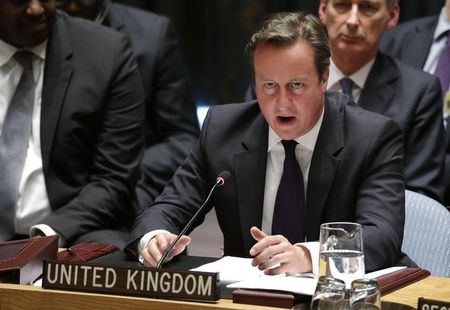By Stella Dawson
NEW YORK (Thomson Reuters Foundation) - British Prime Minister David Cameron urged world leaders to adopt 10 "simple and inspiring" global goals to end extreme poverty in 15 years, including one that targets bribery and corruption.
Every indicator on poverty - from women dying in childbirth to children denied an education - shows that the more corrupt a society, the poorer its people, Cameron said on Wednesday at an event on the sidelines of the United Nations' annual meetings.
"Why in too many cases does aid not get through to the people who need it the most? The answer: corruption. Why do so many countries with massive mineral wealth have rich elites and large numbers in grinding poverty? Corruption," he said.
"So don't let anyone keep corruption out of how we tackle poverty."
Yet getting countries to agree on anti-corruption goals has proved challenging, said Helen Clark, the U.N. Development Programme (UNDP) administrator.
The current U.N. development goals expire in 2015.
A U.N. working group has proposed 17 new goals, including one on open and responsive governments - to "promote peaceful and inclusive societies, provide access to justice for all, and build effective, accountable and inclusive institutions".
"This area has proved to be one of the most controversial in the whole debate and will require very, very powerful advocacy," Clark said at the event sponsored by the anti-corruption advocacy group Transparency International.
Targets to measure progress towards this goal would include providing all citizens with a legal identity so they can claim their rights and pursue opportunities; ensuring public access to information; and reducing corruption.
A U.N. survey of more than 5 million respondents on the new development goals found that honest, effective government ranked as one of the top four priorities, along with education, healthcare and better job opportunities.
Clark said that the UNDP has found that when governance is weak, corruption and abuse of power grows, making it harder for communities and countries to move ahead.
"We believe that transparent, responsive, and accountable institutions are a vital part of what it takes to improve people's lives and implement a sustainable development agenda," she said.
Ghana's President John Dramani Mahama threw his support behind the drive, but noted that it is not simply about ending the corruption that depletes resources in poor countries.
There is also a need to address financial and legal frameworks in the developed world that allow multinationals to plunder those countries, he said.
Mahama cited the sophisticated accounting techniques corporations use to hide revenues and reduce taxes paid in host countries.
Cameron pledged to continue pushing the Group of 20 richest developed and emerging nations on initiatives for sharing tax information and setting up public registries of who owns shell companies.
The UK is at the forefront in drawing up its public registry but faces criticism for providing a loophole for privately held trusts.

(This version of the story corrects survey results in paragraph 10)
(Reporting by Stella Dawson, Editing by Alisa Tang)
